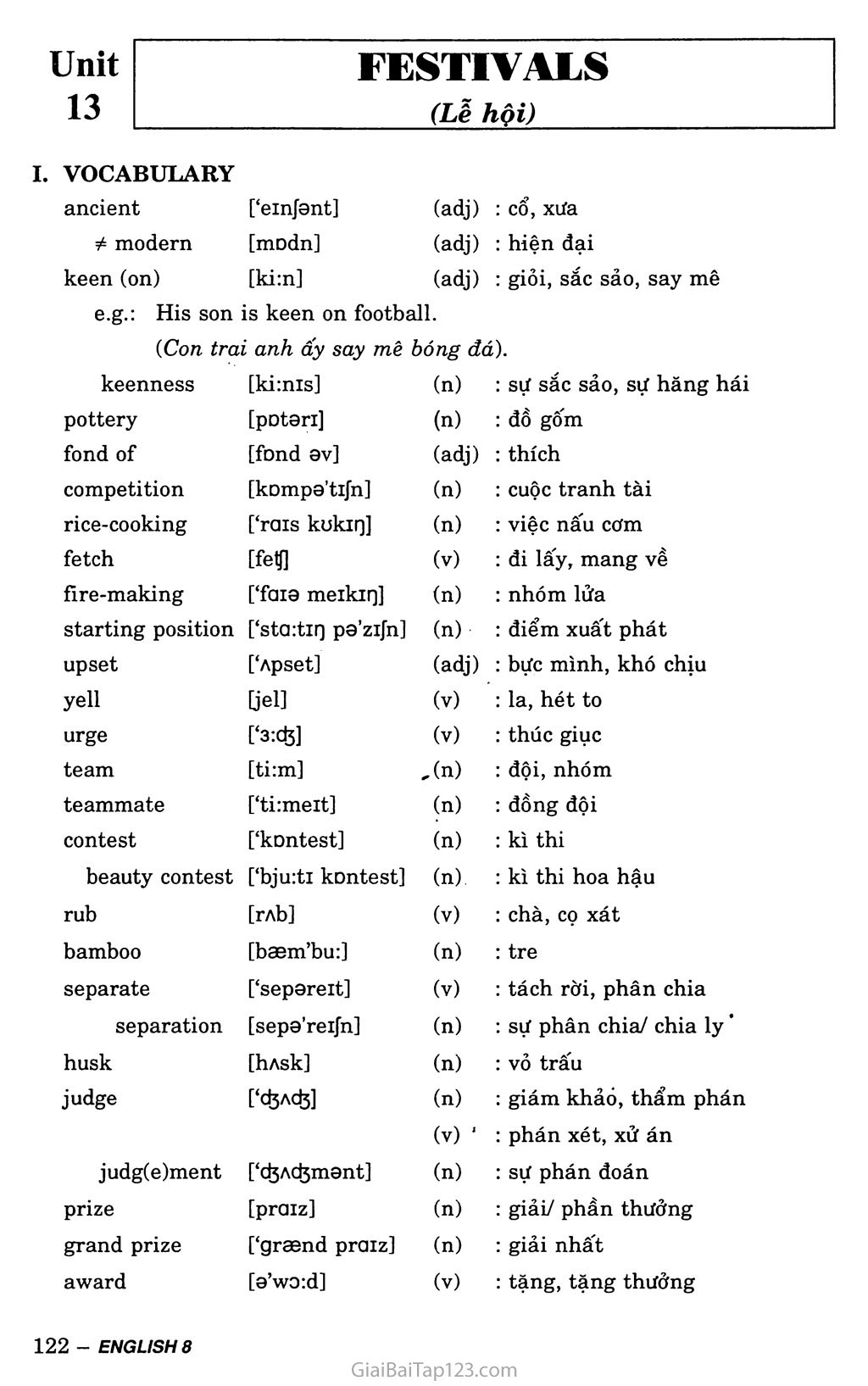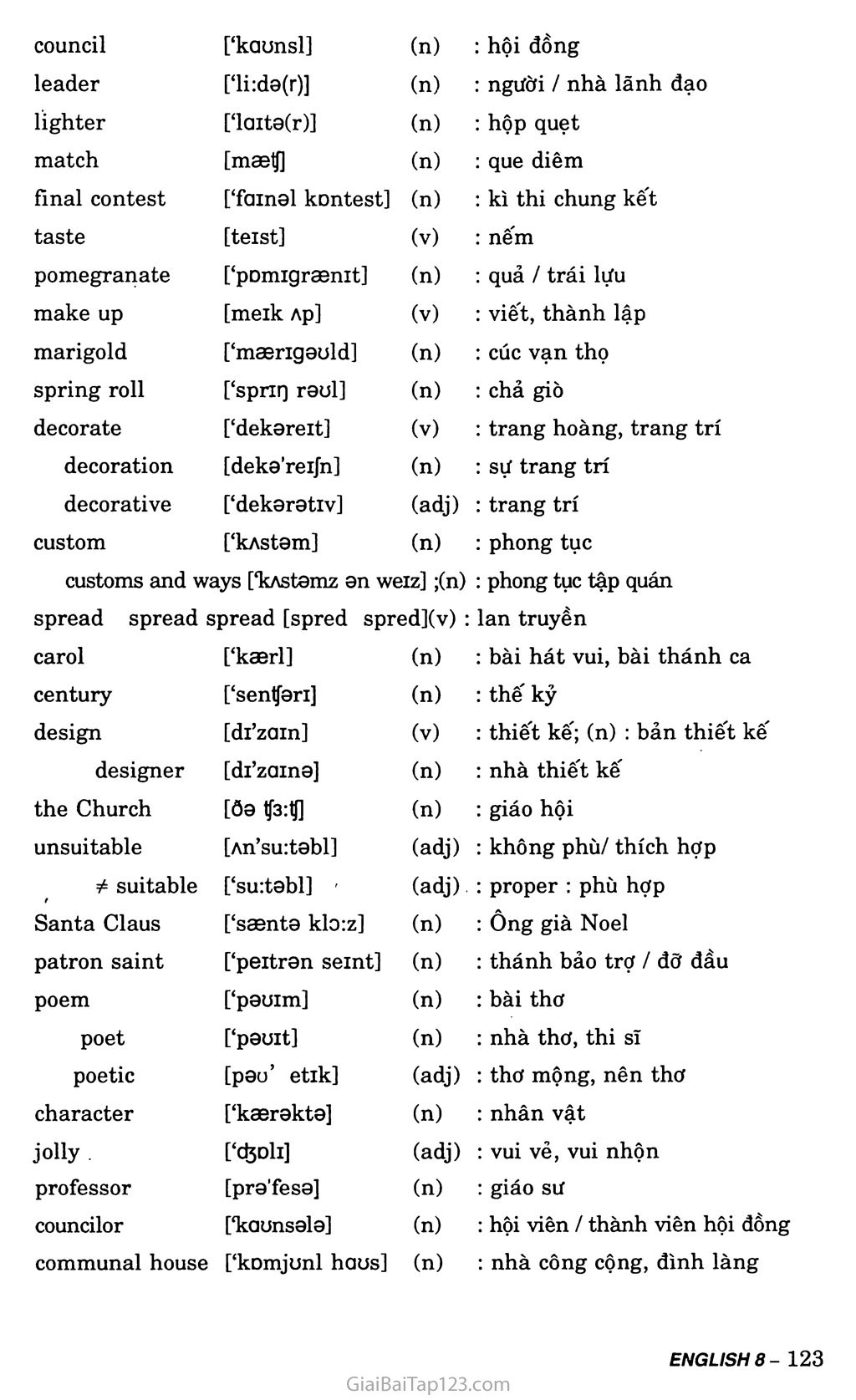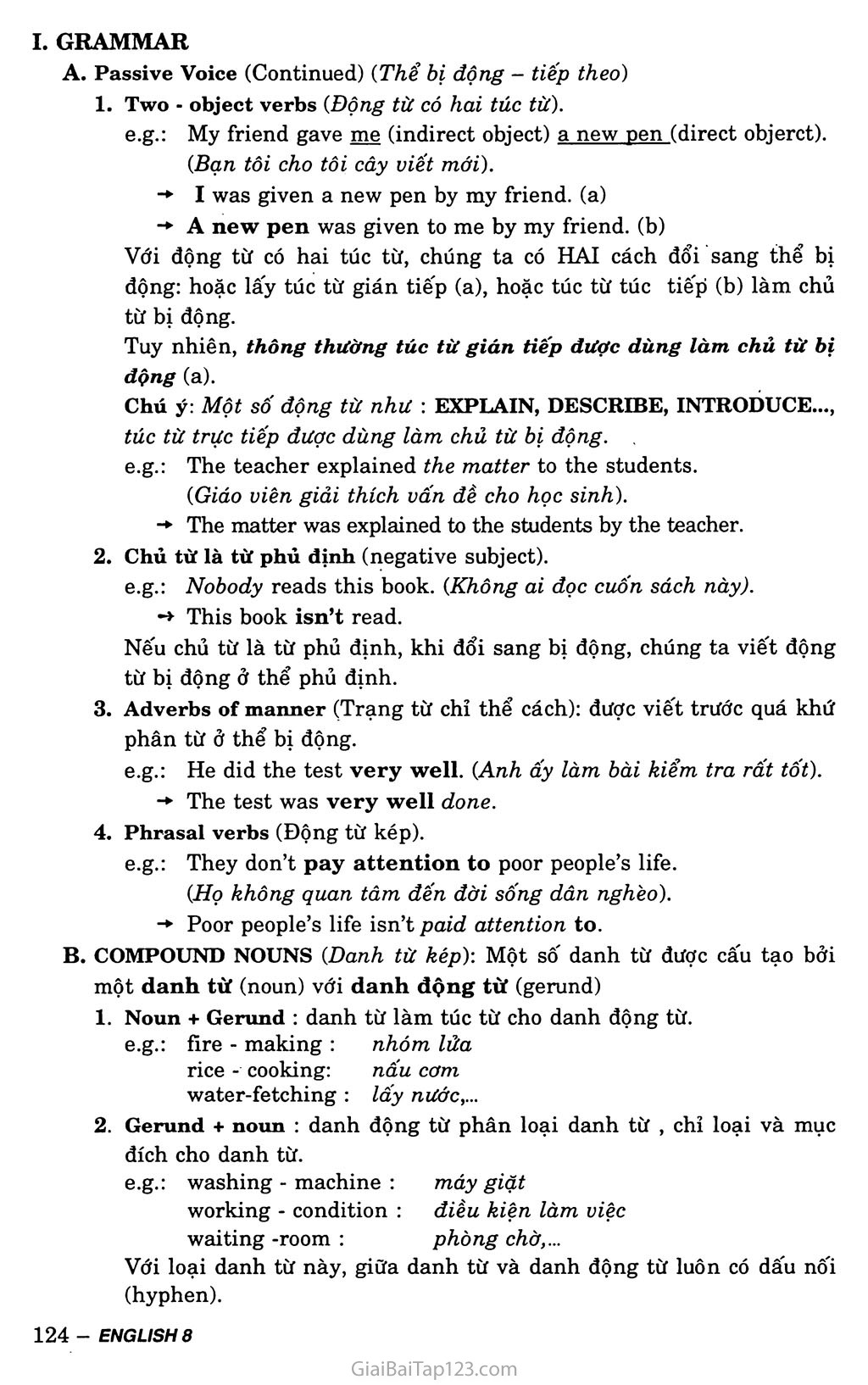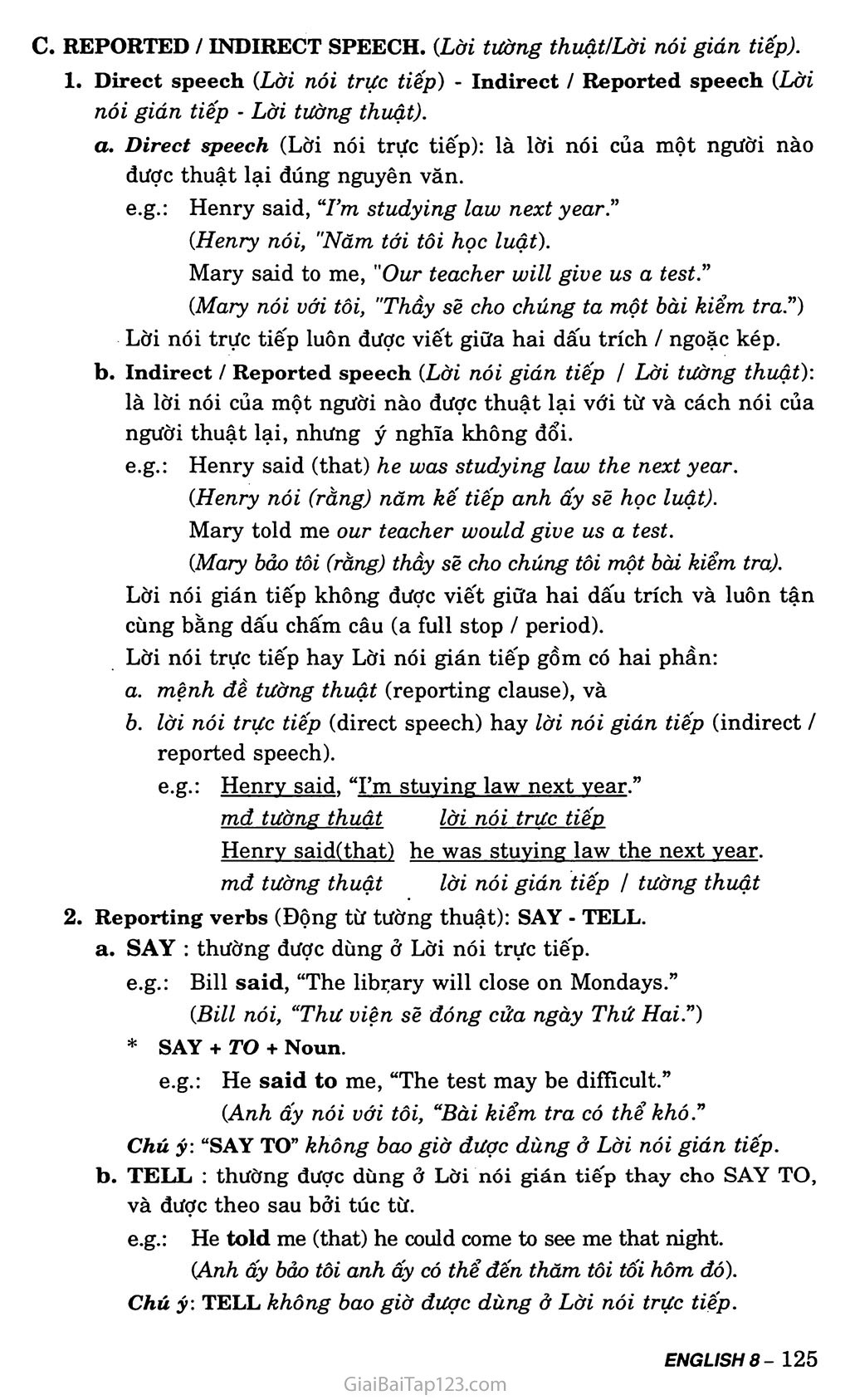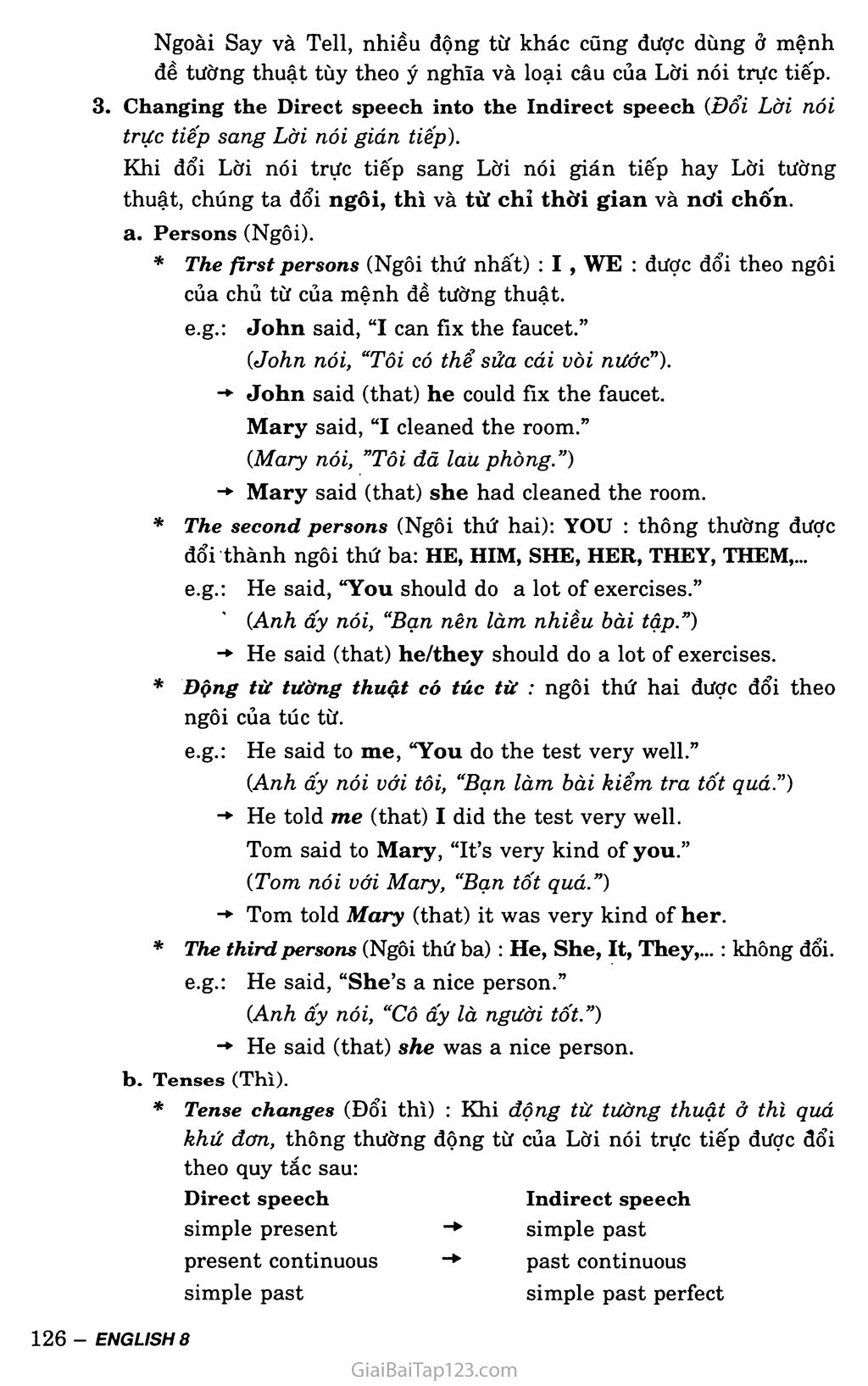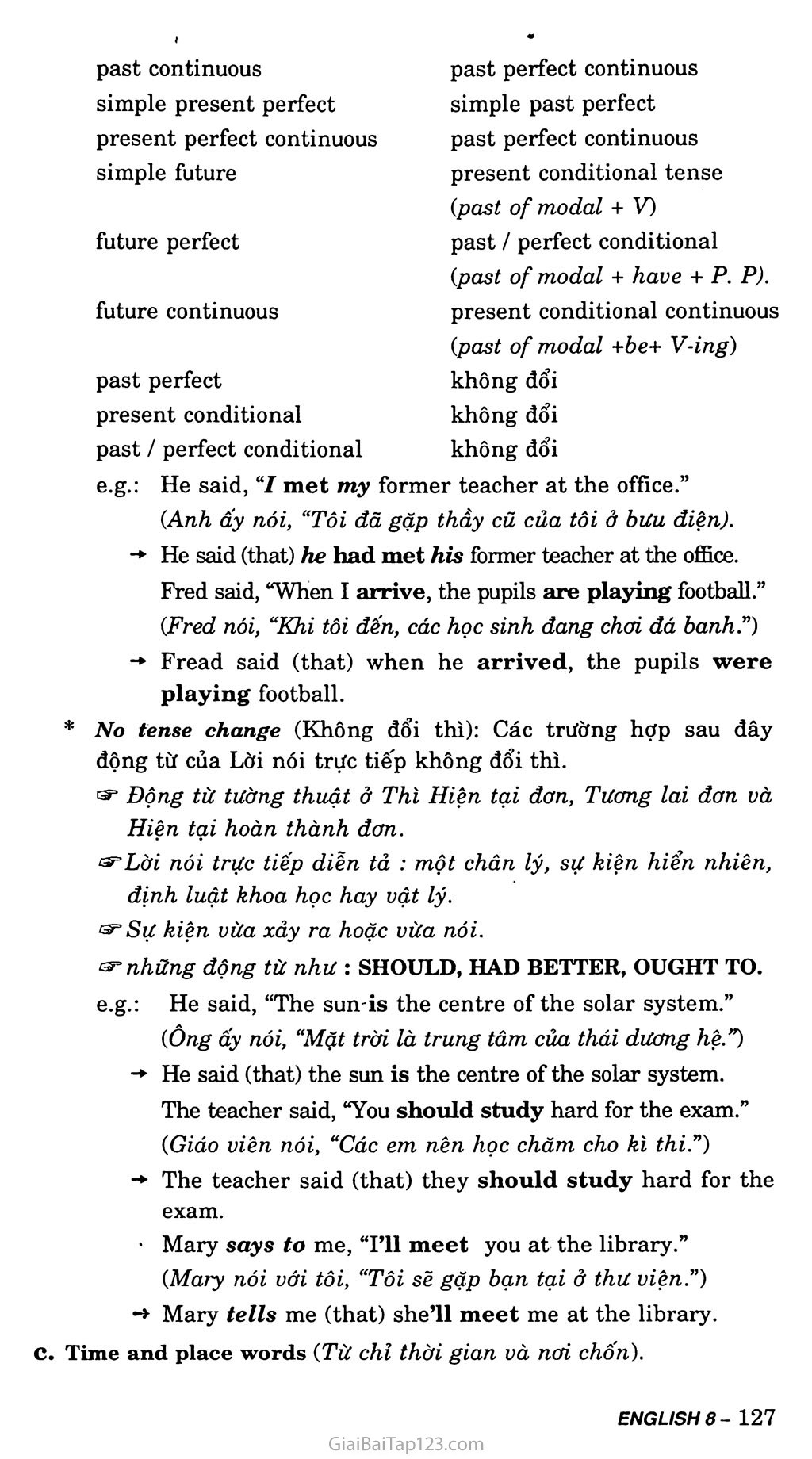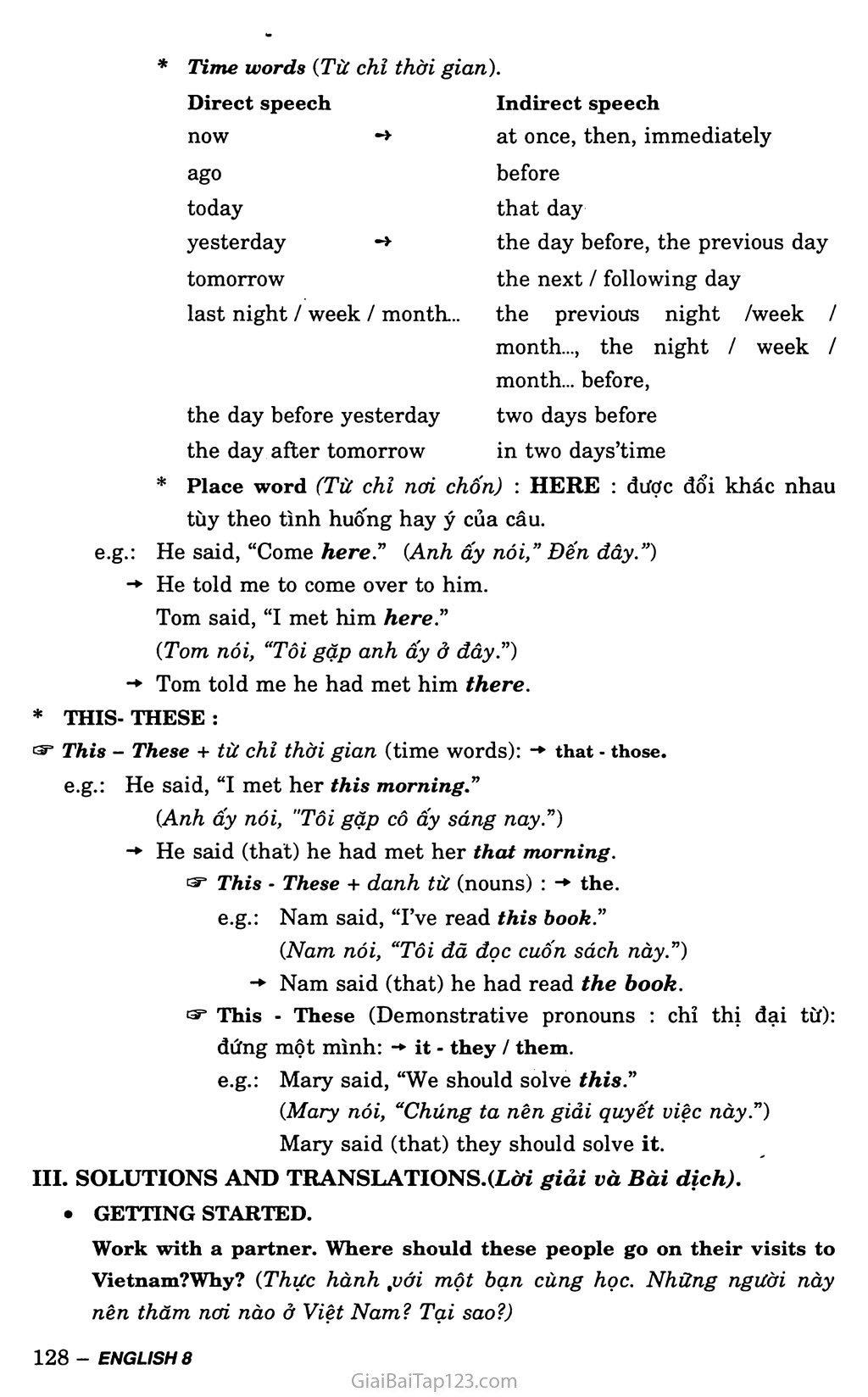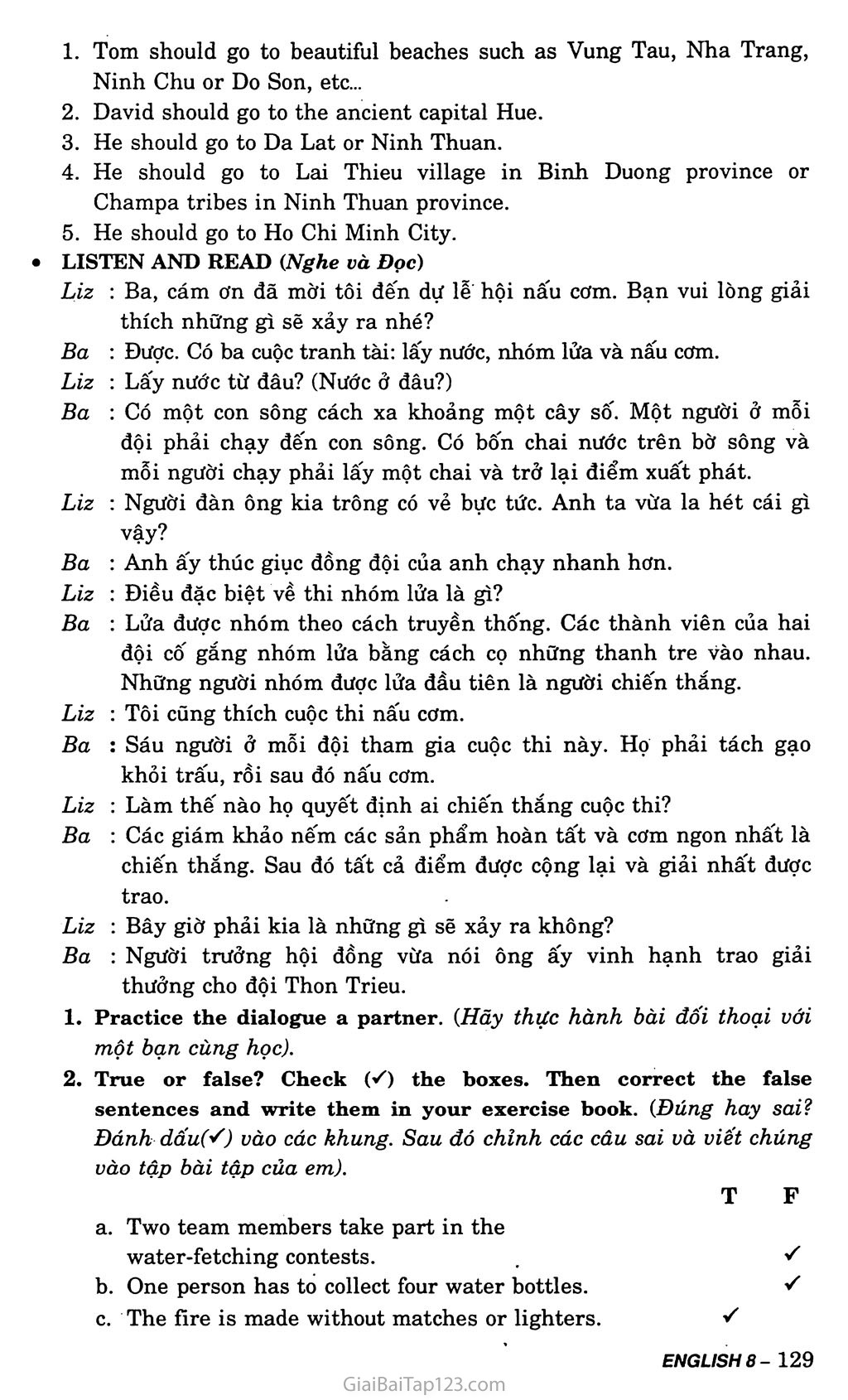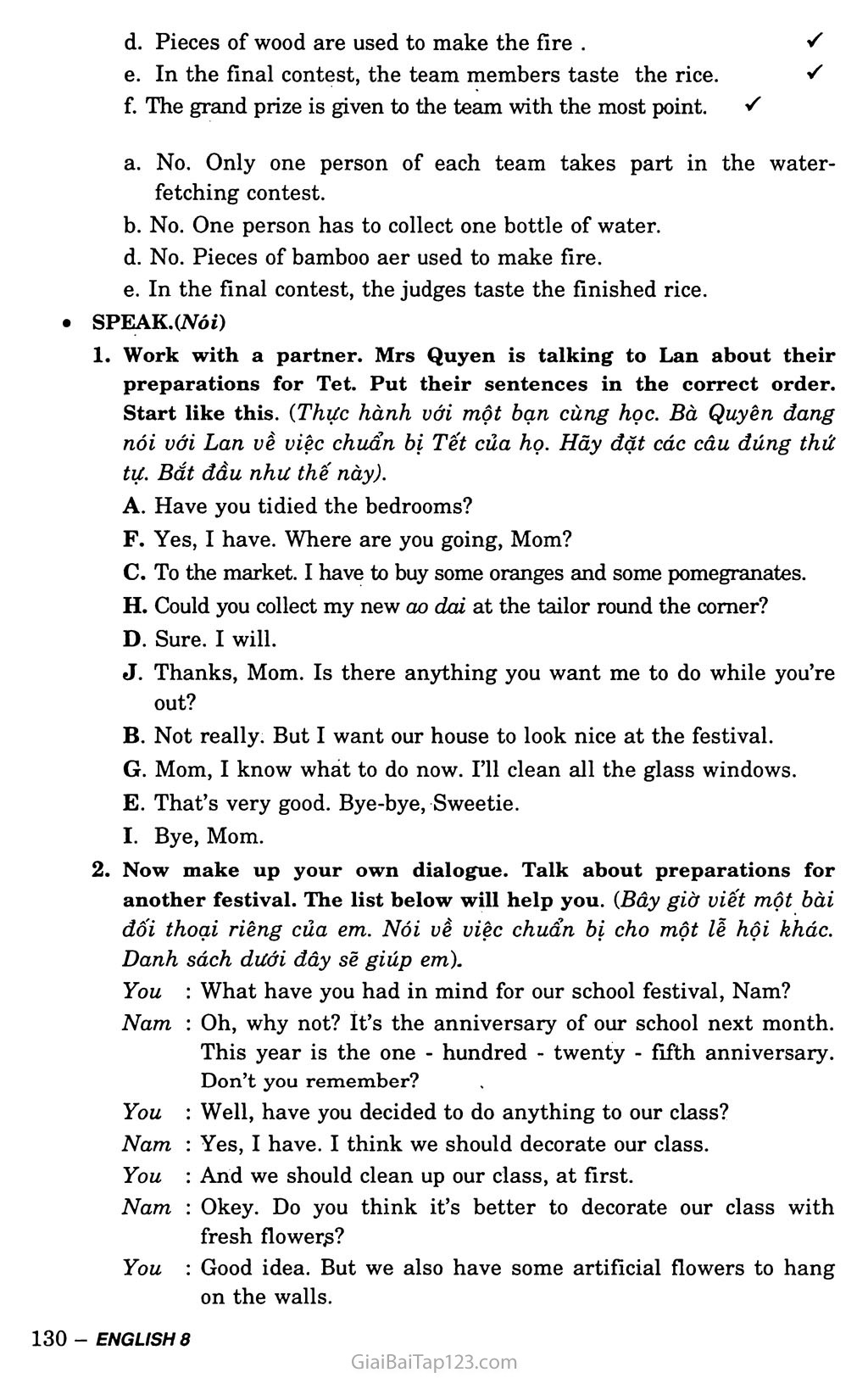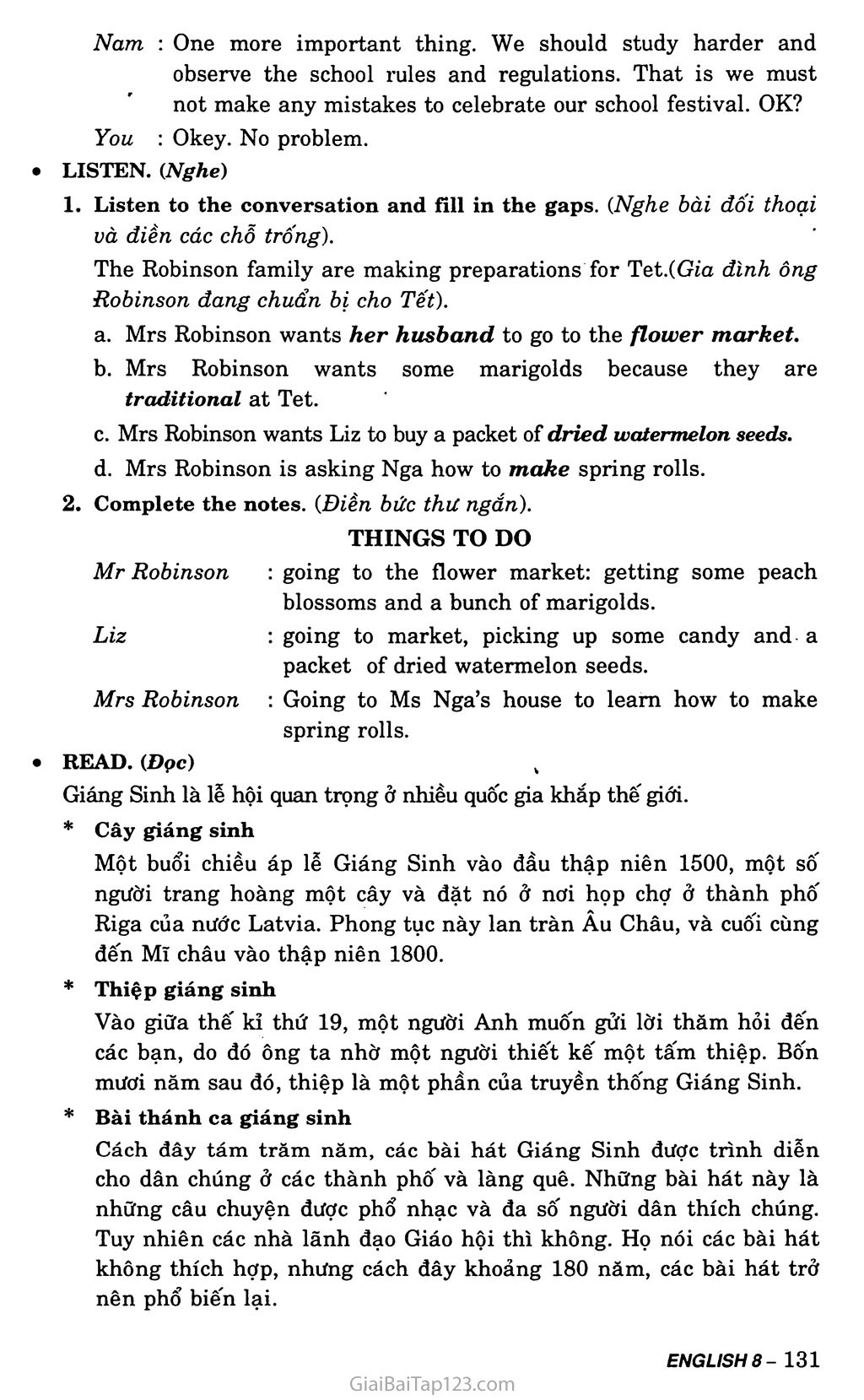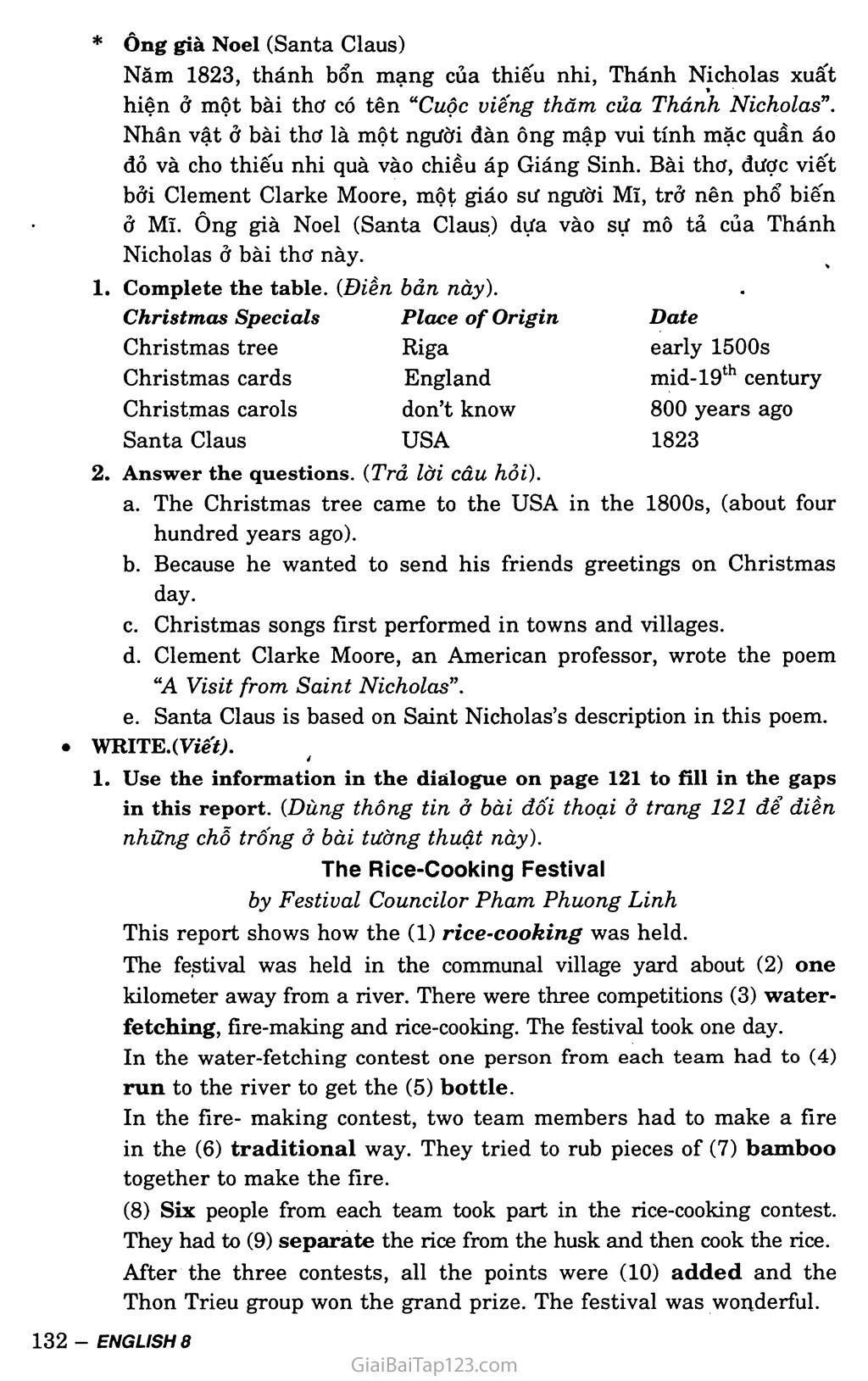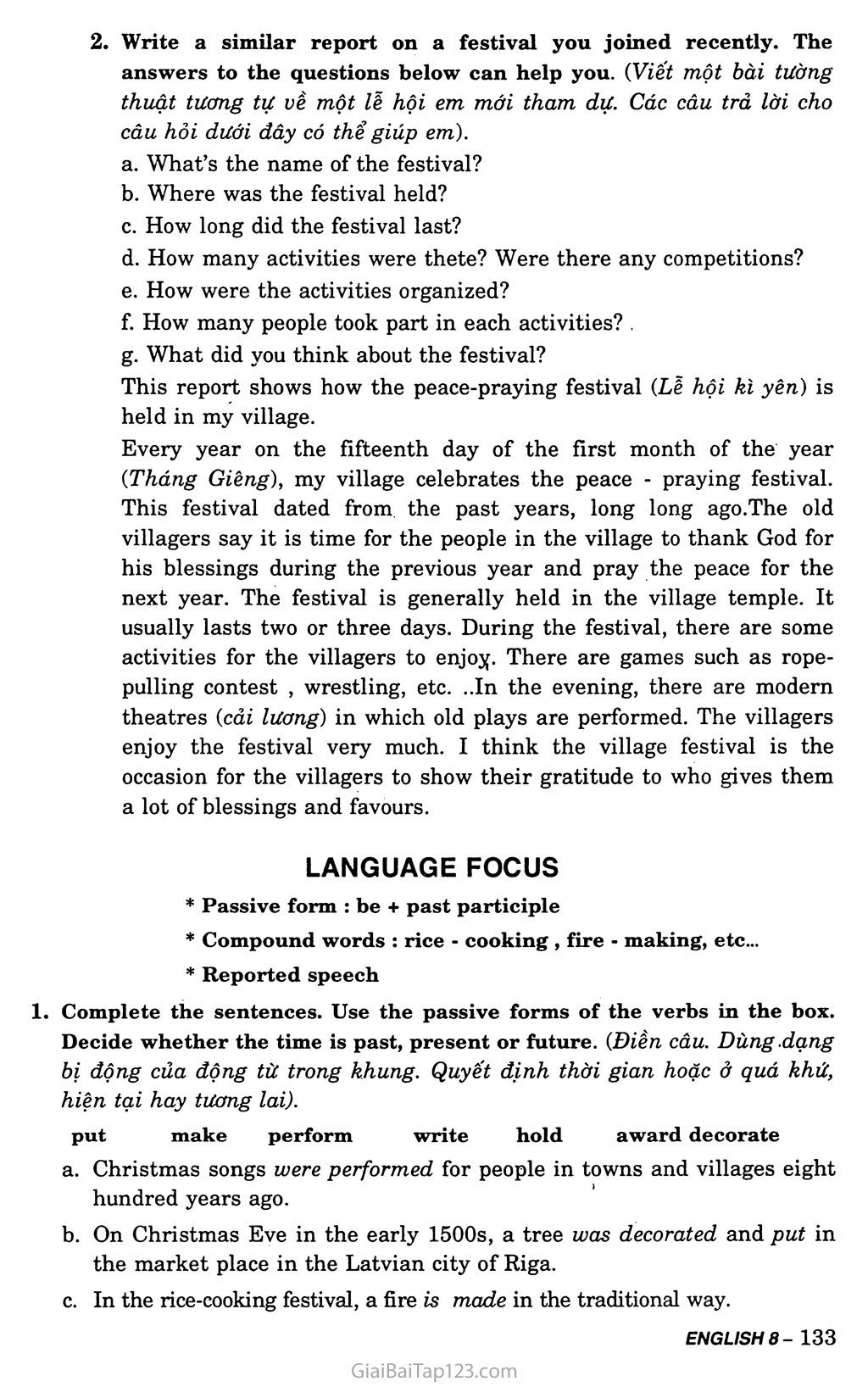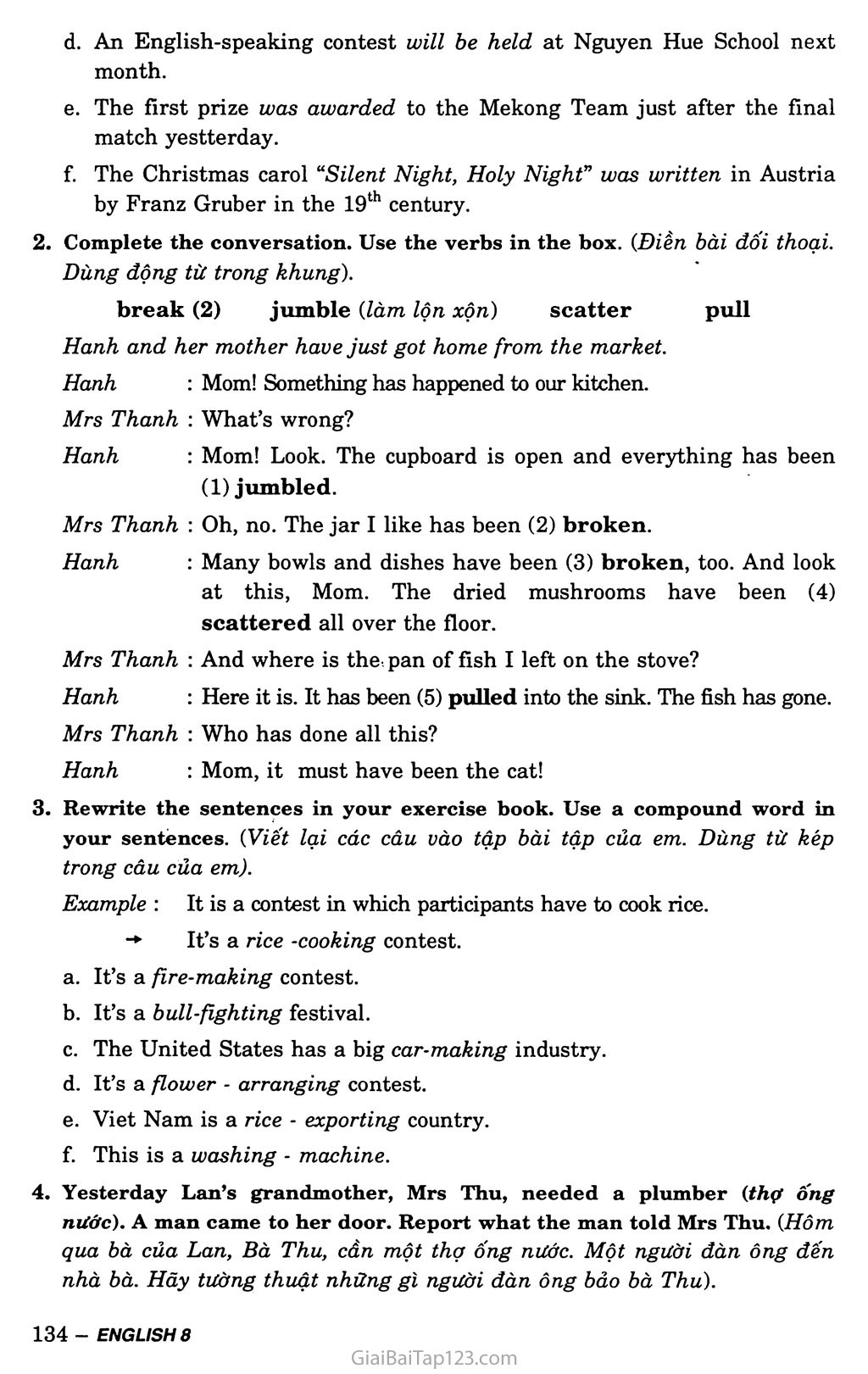Giải tiếng Anh lớp 8 Unit 13: Festivals
Unit
13
FESTIVALS
(Lễ hội)
I. VOCABULARY
ancient
[‘einfant]
(adj)
cổ, xưa
/ modern
[mDdn]
(adj)
hiện đại
keen (on)
[ki:n]
(adj)
giỏi, sắc sảo, say mê
e.g.: His son is keen on football.
(Con trai anh ấy say mè bóng đá).
keenness
[ki:nis]
(n)
sự sắc sảo, sự hăng hái
pottery
[pDtari]
(n)
đồ gốm
fond of
[fDnd 9v]
(adj)
thích
competition
[kDmpa’tifn]
(n)
cuộc tranh tài
rice-cooking
[‘rais kukiQ]
(n)
việc nấu cơm
fetch
[feự]
(v)
đi lấy, mang về
fire-making
[‘fare meikii]]
(n)
nhóm lửa
starting position
[lsta:tir] pa’zifn]
(n)
điểm xuất phát
upset
[‘Apset]
(adj)
bực mình, khó chịu
yell
Del]
(v)
la, hét to
urge
[‘3:05]
(v)
thúc giục
team
[ti:m]
,(n)
đội, nhóm
teammate
[‘tirmeit]
(n)
đồng đội
contest
[‘kDntest]
(n)
kì thi
beauty contest
[‘bju:ti kDntest]
(n)
kì thi hoa hậu
rub
[rAb]
(v)
chà, cọ xát
bamboo
[bsem’bu:]
(n)
tre
separate
[‘separeit]
(v)
tách rời, phân chia
separation
[sepa’reijn]
(n)
sự phân chia/ chia ly'
husk
[hAsk]
(n)
vỏ trấu
judge
[‘d5Ad5]
(n)
giám khảó, thẩm phán
judg(e)ment
[‘djAdjmant]
(v) 1
(n)
phán xét, xử án
sự phán đoán
prize
[praiz]
(n)
giải/ phần thưởng
grand prize
[‘grsend praiz]
(n)
giải nhất
award
[a’wo:d]
(v)
tặng, tặng thưởng
council
[‘kaunsl]
(n)
hội đồng
leader
[‘li:d9(r)]
(n)
người / nhà lãnh đạo
lighter
[‘laite(r)]
(n)
hộp quẹt
match
[msetfl
(n)
que diêm
final contest
[‘fainal kDntest]
(n)
kì thi chung kết
taste
[teist]
(v)
nếm
pomegranate
[‘pDmigrsenit]
(n)
quả / trái lựu
make up
[meik Ap]
(v)
viết, thành lập
marigold
[‘mserigguld]
(n)
cúc vạn thọ
spring roll
[‘sprig real]
(n)
chả giò
decorate
[‘dekareit]
(v)
trang hoàng, trang trí
decoration
[dekg’reifn]
(n)
sự trang trí
decorative
[‘dek9r9tiv]
(adj)
trang trí
custom
[‘kAstam]
(n)
phong tục
customs and ways [‘kAstemz 9n weiz] ;(n)
phong tục tập quán
spread spread spread [spred spred](v) :
lan truyền
carol
[‘kaerl]
(n)
bài hát vui, bài thánh ca
century
[‘sentfari]
(n)
thế kỷ
design
[dizain]
(v)
thiết kế; (n) : bản thiết kế
designer
[di’zaina]
(n)
nhà thiết kế
the Church
[Õ9 ỊM
(n)
giáo hội
unsuitable
[An’su:t9bl]
(adj)
không phù/ thích hợp
/ suitable
[‘su:tabl] '
(adj)
proper : phù hợp
Santa Claus
[‘ssenta klo:z]
(n)
Ông già Noel
patron saint
[‘peitr9n seint]
(n)
thánh bảo trợ / đỡ đầu
poem
[‘pauim]
(n)
bài thơ
poet
[lp9Ult]
(n)
nhà thơ, thi sĩ
poetic
[p9u’ etik]
(adj)
thơ mộng, nên thơ
character
[‘kaerakte]
(n)
nhân vật
jolly
[‘Ợ5DI1]
(adj)
vui vẻ, vui nhộn
professor
[pra’fesn]
(n)
giáo sư
councilor
[‘kaunsala]
(n)
hội viên / thành viên hội đồng
communal house
[‘kDmjunl haus]
(n)
nhà công cộng, đình làng
GRAMMAR
Passive Voice (Continued) {Thể bị động - tiếp theo}
Two - object verbs {Động từ có hai túc từ}.
g.: My friend gave me (indirect object) a new pen (direct objerct). {Bạn tôi cho tôi cây viết mới}.
-*■ 1 was given a new pen by my friend, (a)
-* A new pen was given to me by my friend, (b)
Với động từ có hai túc từ, chúng ta có HAI cách đổi sang thể bị động: hoặc lấy túc từ gián tiếp (a), hoặc túc từ túc tiếp (b) làm chủ từ bị động.
Tuy nhiên, thông thường túc từ gián tiếp được dùng làm chủ từ bị động (a).
Chú ý: Một số động từ như : EXPLAIN, DESCRIBE, INTRODUCE...,
túc từ trực tiếp được dùng làm chủ từ bị động.
e.g.: The teacher explained the matter to the students.
{Giáo viên giải thích vấn đề cho học sinh}.
-* The matter was explained to the students by the teacher.
Chủ từ là từ phủ định (negative subject).
e.g.: Nobody reads this book. {Không ai đọc cuốn sách này).
This book isn’t read.
Nếu chủ từ là từ phủ định, khi đổi sang bị động, chúng ta viết động từ bị động ở thể phủ định.
Adverbs of manner (Trạng từ chỉ thể cách): được viết trước quá khứ phân từ ở thể bị động.
e.g.: He did the test very well. {Anh ấy làm bài kiểm tra rất tốt}. -* The test was very well done.
Phrasal verbs (Động từ kép).
e.g.: They don’t pay attention to poor people’s life.
{Họ không quan tâm đến đời sống dân nghèo}.
-* Poor people’s life isn’t paid attention to.
COMPOUND NOUNS {Danh từ kép}-. Một sô' danh từ được cấu tạo bởi một danh từ (noun) với danh động từ (gerund)
Noun + Gerund : danh từ làm túc từ cho danh động từ. e.g.: fire - making : nhóm lửa
rice - cooking: nấu cơm
water-fetching : lấy nước,...
Gerund + noun : danh động từ phân loại danh từ , chỉ loại và mục đích cho danh từ.
e.g.: washing-machine: máy giặt
working - condition : diều kiện làm việc waiting -room : phòng chờ,...
Với loại danh từ này, giữa danh từ và danh động từ luôn có dấu nô'i (hyphen).
c. REPORTED / INDIRECT SPEECH. (Lời tường thuậtlLời nói gián tiếp).
Direct speech (Lời nói trực tiếp) - Indirect / Reported speech (Lời nói gián tiếp - Lời tường thuật).
Direct speech (Lời nói trực tiếp): là lời nói của một người nào được thuật lại đúng nguyên văn.
e.g.: Henry said, “I’m studying law next year.”
(Henry nói, "Năm tới tôi học luật).
Mary said to me, "Our teacher will give US a test.”
(Mary nói với tôi, "Thầy sẽ cho chúng ta một bài kiểm tra.”)
Lời nói trực tiếp luôn được viết giữa hai dấu trích / ngoặc kép.
Indirect / Reported speech (Lời nói gián tiếp / Lời tường thuật)'. là lời nói của một người nào được thuật lại với từ và cách nói của người thuật lại, nhưng ý nghĩa không đổi.
e.g.: Henry said (that) he was studying law the next year.
(Henry nói (rằng) năm kế tiếp anh ấy sẽ học luật).
Mary told me our teacher would give US a test.
(Mary bảo tôi (rằng) thầy sẽ cho chúng tôi một bài kiểm tra).
Lời nói gián tiếp không được viết giữa hai dấu trích và luôn tận cùng bằng dấu chấm câu (a full stop / period).
Lời nói trực tiếp hay Lời nói gián tiếp gồm có hai phần:
mệnh đề tường thuật (reporting clause), và
lời nói trực tiếp (direct speech) hay lời nói gián tiếp (indirect / reported speech).
e.g.: Henry said, “I’m stuving law next year.” mđ tường thuât lời nói trực tiếp Henry said(that) he was stuying law the next year. md tường thuật lời nói gián tiếp / tường thuật
Reporting verbs (Động từ tường thuật): SAY - TELL.
SAY : thường được dùng ở Lời nói trực tiếp.
e.g.: Bill said, “The library will close on Mondays.”
(Bill nói, “Thư viện sẽ đóng cửa ngày Thứ Hai.”)
* SAY + TO + Noun.
e.g.: He said to me, “The test may be difficult.”
(Anh ấy nói với tôi, “Bài kiểm tra có thể khó.”
Chú ý'. “SAY TO” không bao giờ được dùng ở Lời nói gián tiếp.
TELL : thường được dùng ở Lời nói gián tiếp thay cho SAY TO, và được theo sau bởi túc từ.
e.g.: He told me (that) he could come to see me that night.
(Anh ấy bảo tôi anh ấy có thể đến thăm tôi tối hôm đó).
Chú ý: TELL không bao giờ được dùng ở Lời nói trực tiếp.
Ngoài Say và Tell, nhiều động từ khác cũng được dùng ở mệnh đề tường thuật tùy theo ý nghĩa và loại câu của Lời nói trực tiếp.
Changing the Direct speech into the Indirect speech {Đổi Lời nói trực tiếp sang Lời nói gián tiếp).
Khi đổi Lời nói trực tiếp sang Lời nói gián tiếp hay Lời tường thuật, chúng ta đổi ngôi, thì và từ chỉ thời gian và nơi chôn.
Persons (Ngôi).
The first persons (Ngôi thứ nhất) : I , WE : được đổi theo ngôi của chủ từ của mệnh đề tường thuật.
e.g.: John said, “I can fix the faucet.”
{John nói, “Tôi có thể sửa cái vòi nước”).
-*■ John said (that) he could fix the faucet.
Mary said, “I cleaned the room.”
{Mary nói, ”Tôi đã lau phòng.”)
-*■ Mary said (that) she had cleaned the room.
The second persons (Ngôi thứ hai): YOU : thông thường được đổi thành ngôi thứ ba: HE, HIM, SHE, HER, THEY, THEM,... e.g.: He said, “You should do a lot of exercises.”
{Anh ấy nói, “Bạn nên làm nhiều bài tập.”)
-*■ He said (that) he/they should do a lot of exercises.
Dộng từ tường thuật có túc từ : ngôi thứ hai được đổi theo ngôi của túc từ.
e.g.: He said to me, “You do the test very well.”
{Anh ấy nói với tôi, “Bạn làm bài kiểm tra tốt quá.”)
-*■ He told me (that) I did the test very well.
Tom said to Mary, “It’s very kind of you.”
{Tom nói với Mary, “Bạn tốt quá.”)
-*■ Tom told Mary (that) it was very kind of her.
The third persons (Ngôi thứ ba) : He, She, It, They,... : không đổi. e.g.: He said, “She’s a nice person.”
{Anh ấy nói, “Cô ấy là người tốt.”)
-*■ He said (that) she was a nice person.
Tenses (Thì).
Tense changes (Đổi thì) : Khi động từ tường thuật ở thì quá khứ đơn, thông thường động từ của Lời nói trực tiếp được đổi theo quy tắc sau:
Direct speech Indirect speech
simple present -*■ simple past
present continuous -*■ past continuous
simple past simple past perfect
past continuous simple present perfect present perfect continuous simple future
future perfect
future continuous
past perfect
present conditional past / perfect conditional
past perfect continuous simple past perfect past perfect continuous present conditional tense {past of modal + V) past / perfect conditional {past of modal + have + p. P). present conditional continuous {past of modal +be+ V-ing) không đổi không đổi không đổi
e.g.: He said, “I met my former teacher at the office.”
{Anh ấy nói, “Tôi đã gặp thầy củ của tôi ở bưu điện).
-*■ He said (that) he had met his former teacher at the office. Fred said, ‘When I arrive, the pupils are playing football.” {Fred nói, “Khi tôi đến, các học sinh đang chơi đá banh.")
-► Fread said (that) when he arrived, the pupils were playing football.
* No tense change (Không đổi thì): Các trường hợp sau đây động từ của Lời nói trực tiếp không đổi thì.
S’ Động từ tường thuật ở Thì Hiện tại đơn, Tương lai đơn và
Hiện tại hoàn thành đơn.
e^Lời nói trực tiếp diễn tả : một chân lý, sự kiện hiển nhiên, định luật khoa học hay vật lý.
s^Sự kiện vừa xảy ra hoặc vừa nói.
những động từ như : SHOULD, HAD BETTER, OUGHT TO.
e.g.: He said, “The sun is the centre of the solar system.” {Ổng ấy nói, “Mặt trời là trung tâm của thái dương hệ.”)
-* He said (that) the sun is the centre of the solar system.
The teacher said, “You should study hard for the exam.” {Giáo viên nói, “Các em nên học chăm cho kì thi.”)
-* The teacher said (that) they should study hard for the exam.
• Mary says to me, “I’ll meet you at the library.”
{Mary nói với tôi, “Tôi sẽ gặp bạn tại ở thư viện.”)
Mary tells me (that) she’ll meet me at the library.
c. Time and place words {Từ chỉ thời gian và nơi chốn).
* Time words (Từ chỉ thời gian').
Direct speech now
ago
today
yesterday
tomorrow
last night / week / month..
the day before yesterday the day after tomorrow
Indirect speech
at once, then, immediately
before
that day
the day before, the previous day
the next / following day
the previous night /week /
month..., the night / week /
month... before,
two days before
in two days’time
* Place word (Từ chỉ nơi chốn) : HERE : được đổi khác nhau tùy theo tình huống hay ý của câu.
e.g.: He said, “Come here.” (Anh ấy nói,” Đến đây.”')
-*■ He told me to come over to him.
Tom said, “I met him here.”
(Tom nói, “Tôi gặp anh ấy ở đây.”)
Tom told me he had met him there.
* THIS- THESE :
S’ This - These + từ chỉ thời gian (time words): -* that - those, e.g.: He said, “I met her this morning.”
(Anh ấy nói, "Tôi gặp cô ấy sáng nay.”)
-*■ He said (that) he had met her that morning.
S’ This - These + danh từ (nouns) : -*■ the. e.g.: Nam said, “I’ve read this book.”
(Nam nói, “Tôi dã đọc cuốn sách này.”)
-*■ Nam said (that) he had read the book.
S’ This - These (Demonstrative pronouns : chỉ thị đại từ): đứng một mình: -►it - they / them, e.g.: Mary said, “We should solve this.”
(Mary nói, “Chúng ta nên giải quyết việc này.”) Mary said (that) they should solve it.
SOLUTIONS AND TRANSLATIONS.CLỜĨ giải và Bài dịch).
• GETTING STARTED.
Work with a partner. Where should these people go on their visits to Vietnam?Why? (Thực hành ,với một bạn cùng học. Những người này nên thăm nơi nào ở Việt Nam? Tại sao?)
Tom should go to beautiful beaches such as Vung Tau, Nha Trang, Ninh Chu or Do Son, etc...
David should go to the ancient capital Hue.
He should go to Da Lat or Ninh Thuan.
He should go to Lai Thieu village in Sinh Duong province or Champa tribes in Ninh Thuan province.
He should go to Ho Chi Minh City.
• LISTEN AND READ (Nghe và Đọc)
Liz : Ba, cám ơn đã mời tôi đến dự lễ hội nấu cơm. Bạn vui lòng giải thích những gì sẽ xảy ra nhé?
Ba : Được. Có ba cuộc tranh tài: lấy nước, nhóm lửa và nấu cơm.
. Liz : Lấy nước từ đâu? (Nước ở đâu?)
Ba : Có một con sông cách xa khoảng một cây số. Một người ở mỗi đội phải chạy đến con sông. Có bôn chai nước trên bờ sông và mỗi người chạy phải lấy một chai và trở lại điểm xuất phát.
Liz : Người đàn ông kia trông có vẻ bực tức. Anh ta vừa la hét cái gì vậy?
Ba : Anh ấy thúc giục đồng đội của anh chạy nhanh hơn.
Liz : Điều đặc biệt về thi nhóm lửa là gì?
Ba : Lửa được nhóm theo cách truyền thông. Các thành viên của hai đội cô' gắng nhóm lửa bằng cách cọ những thanh tre vào nhau. Những người nhóm được lửa đầu tiên là người chiến thắng.
Liz : Tôi cũng thích cuộc thi nấu cơm.
Ba : Sáu người ở mỗi đội tham gia cuộc thi này. Họ phải tách gạo khỏi trấu, rồi sau đó nấu cơm.
Liz : Làm thế nào họ quyết định ai chiến thắng cuộc thi?
Ba : Các giám khảo nếm các sản phẩm hoàn tất và cơm ngon nhất là
chiến thắng. Sau đó tất cả điểm được cộng lại và giải nhất được trao.
Liz : Bây giờ phải kia là những gì sẽ xảy ra không?
Ba : Người trưởng hội đồng vừa nói ông ấy vinh hạnh trao giải
thưởng cho đội Thon Trieu.
Practice the dialogue a partner. {Hãy thực hành bài đôi thoại với một bạn cùng học).
True or false? Check (X) the boxes. Then correct the false sentences and write them in your exercise book. {Đúng hay sail Đánh dấu(S) vào các khung. Sau đó chỉnh các câu sai và viết chúng vào tập bài tập của em).
Pieces of wood are used to make the fire . s
In the final contest, the team members taste the rice. s
The grand prize is given to the team with the most point. Y
No. Only one person of each team takes part in the water fetching contest.
No. One person has to collect one bottle of water.
No. Pieces of bamboo aer used to make fire.
In the final contest, the judges taste the finished rice.
• SPEAK.(íVóí)
Work with a partner. Mrs Quyen is talking to Lan about their preparations for Tet. Put their sentences in the correct order. Start like this. {Thực hành với một bạn cùng học. Bà Quyển đang nói với Lan về việc chuẩn bị Tết của họ. Hãy đặt các câu đúng thứ tự. Bắt đầu như thế này).
Have you tidied the bedrooms?
Yes, I have. Where are you going, Mom?
To the market. I have to buy some oranges and some pomegranates.
Could you collect my new ao dai at the tailor round the comer?
Sure. I will.
J. Thanks, Mom. Is there anything you want me to do while you’re out?
Not really. But I want our house to look nice at the festival.
Mom, I know what to do now. I’ll clean all the glass windows.
That’s very good. Bye-bye, Sweetie.
Bye, Mom.
Now make up your own dialogue. Talk about preparations for another festival. The list below will help you. {Bây giờ viết một bài đối thoại riêng của em. Nói về việc chuẩn bị cho một lễ hội khác. Danh sách dưới đây sẽ giúp em').
You : What have you had in mind for our school festival, Nam? Nam : Oh, why not? It’s the anniversary of our school next month.
This year is the one - hundred - twenty - fifth anniversary. Don’t you remember?
You : Well, have you decided to do anything to our class?
Nam : Yes, I have. I think we should decorate our class.
You : And we should clean up our class, at first.
Nam : Okey. Do you think it’s better to decorate our class with
fresh flowery?
You : Good idea. But we also have some artificial flowers to hang on the walls.
Nam. : One more important thing. We should study harder and observe the school rules and regulations. That is we must not make any mistakes to celebrate our school festival. OK?
You : Okey. No problem.
LISTEN. (Nghe)
Listen to the conversation and fill in the gaps. (Nghe bài đối thoại và điền các chỗ trống).
The Robinson family are making preparations for Tet.(Gia đình ông Robinson đang chuẩn bị cho Tết).
Mrs Robinson wants her husband to go to the flower market.
Mrs Robinson wants some marigolds because they are traditional at Tet.
Mrs Robinson wants Liz to buy a packet of dried watermelon seeds.
Mrs Robinson is asking Nga how to make spring rolls.
Complete the notes. (Điền bức thư ngắn).
THINGS TO DO
Mr Robinson : going to the flower market: getting some peach blossoms and a bunch of marigolds.
Liz : going to market, picking up some candy and a
packet of dried watermelon seeds.
Mrs Robinson : Going to Ms Nga’s house to learn how to make spring rolls.
READ. (Đọc)
Giáng Sinh là lễ hội quan trọng ở nhiều quốc gia khắp thế giới.
Cây giáng sinh
Một buổi chiều áp lễ Giáng Sinh vào đầu thập niên 1500, một số người trang hoàng một cây và đặt nó ở nơi họp chợ ở thành phô' Riga của nước Latvia. Phong tục này lan tràn Âu Châu, và cuối cùng đến Mĩ châu vào thập niên 1800.
Thiệp giáng sinh
Vào giữa thế kỉ thứ 19, một người Anh muôn gửi lời thăm hỏi đến các bạn, do đó ông ta nhờ một người thiết kế một tấm thiệp. Bốn mươi năm sau đó, thiệp là một phần của truyền thống Giáng Sinh.
Bài thánh ca giáng sinh
Cách đây tám trăm năm, các bài hát Giáng Sinh được trình diễn cho dân chúng ở các thành phô' và làng quê. Những bài hát này là những câu chuyện được phổ nhạc và đa số người dân thích chúng. Tuy nhiên các nhà lãnh đạo Giáo hội thì không. Họ nói các bài hát không thích hợp, nhưng cách đây khoảng 180 năm, các bài hát trở nên phổ biến lại.
* Ông già Noel (Santa Claus)
Năm 1823, thánh bổn mạng của thiếu nhi, Thánh Nicholas xuất hiện ở một bài thơ có tên “Cuộc viếng thăm của Thánh Nicholas”. Nhân vật ở bài thơ là một người đàn ông mập vui tính mặc quần áo đỏ và cho thiếu nhi quà vào chiều áp Giáng Sinh. Bài thơ, được viết bởi Clement Clarke Moore, một giáo sư người Mĩ, trở nên phổ biến ở Mĩ. Ông già Noel (Santa Claus) dựa vào sự mô tả của Thánh Nicholas ở bài thơ này.
1. Complete the table. {Điền bản này).
Christmas Specials
Place of Origin
Date
Christmas tree
Riga
early 1500s
Christmas cards
England
mid-19th century
Christmas carols
don’t know
800 years ago
Santa Claus
USA
1823
2. Answer the questions. {Trả lời câu hỏi).
The Christmas tree came to the USA in the 1800s, (about four hundred years ago).
Because he wanted to send his friends greetings on Christmas day.
Christmas songs first performed in towns and villages.
Clement Clarke Moore, an American professor, wrote the poem “A Visit from Saint Nicholas”.
Santa Claus is based on Saint Nicholas’s description in this poem.
• WRITE.(Viei).
Use the information in the dialogue on page 121 to fill in the gaps in this report. {Dùng thông tin ở bài đối thoại ở trang 121 để điền những chỗ trống ở bài tường thuật này).
The Rice-Cooking Festival
by Festival Councilor Pham Phuong Linh
This report shows how the (1) rice-cooking was held.
The festival was held in the communal village yard about (2) one kilometer away from a river. There were three competitions (3) water fetching, fire-making and rice-cooking. The festival took one day.
In the water-fetching contest one person from each team had to (4) run to the river to get the (5) bottle.
In the fire- making contest, two team members had to make a fire in the (6) traditional way. They tried to rub pieces of (7) bamboo together to make the fire.
(8) Six people from each team took part in the rice-cooking contest. They had to (9) separate the rice from the husk and then cook the rice. After the three contests, all the points were (10) added and the Thon Trieu group won the grand prize. The festival was wonderful.
Write a similar report on a festival you joined recently. The answers to the questions below can help you. (Viêt một bài tường thuật tương tự về một lễ hội em mới tham dự. Các câu trả lời cho câu hỏi dưới đây có thể giúp em).
What’s the name of the festival?
Where was the festival held?
How long did the festival last?
How many activities were thete? Were there any competitions?
How were the activities organized?
How many people took part in each activities? .
What did you think about the festival?
This report shows how the peace-praying festival (Lễ hội kì yên) is held in my village.
Every year on the fifteenth day of the first month of the year (Tháng Giêng), my village celebrates the peace - praying festival. This festival dated from the past years, long long ago.The old villagers say it is time for the people in the village to thank God for his blessings during the previous year and pray the peace for the next year. The festival is generally held in the village temple. It usually lasts two or three days. During the festival, there are some activities for the villagers to enjoy. There are games such as rope pulling contest , wrestling, etc. ..In the evening, there are modern theatres (cải lương) in which old plays are performed. The villagers enjoy the festival very much. I think the village festival is the occasion for the villagers to show their gratitude to who gives them a lot of blessings and favours.
LANGUAGE FOCUS
Passive form : be + past participle
Compound words : rice - cooking , fire - making, etc...
Reported speech
Complete the sentences. Use the passive forms of the verbs in the box. Decide whether the time is past, present or future. (Điền câu. Dùng .dạng bị dộng của dộng từ trong khung. Quyết định thời gian hoặc ở quá khứ, hiện tại hay tương lai).
put make perform write hold award decorate
Christmas songs were performed for people in towns and villages eight hundred years ago.
On Christmas Eve in the early 1500s, a tree was decorated and put in the market place in the Latvian city of Riga.
In the rice-cooking festival, a fire is made in the traditional way.
An English-speaking contest will be held at Nguyen Hue School next month.
The first prize was awarded to the Mekong Team just after the final match yestterday.
The Christmas carol “Silent Night, Holy Night” was written in Austria by Franz Gruber in the 19th century.
Complete the conversation. Use the verbs in the box. (Điền bài đôi thoại. Dùng động từ trong khung).
break (2) jumble (làm lộn xộn) scatter pull
Hanh and her mother have just got home from the market.
Hanh : Mom! Something has happened to our kitchen.
Mrs Thanh : What’s wrong?
Hanh : Mom! Look. The cupboard is open and everything has been
(1) jumbled.
Mrs Thanh : Oh, no. The jar I like has been (2) broken.
Hanh : Many bowls and dishes have been (3) broken, too. And look at this, Mom. The dried mushrooms have been (4) scattered all over the floor.
Mrs Thanh : And where is the pan of fish I left on the stove?
Hanh : Here it is. It has been (5) pulled into the sink. The fish has gone. Mrs Thanh : Who has done all this?
Hanh : Mom, it must have been the cat!
Rewrite the sentences in your exercise book. Use a compound word in your sentences. (Viết lại các câu vào tập bài tập của em. Dùng từ kép trong câu của em).
Example : It is a contest in which participants have to cook rice.
-* It’s a rice -cooking contest.
It’s a fire-making contest.
It’s a bull-fighting festival.
The United States has a big car-making industry.
It’s a flower - arranging contest.
Viet Nam is a rice - exporting country.
This is a washing - machine.
Yesterday Lan’s grandmother, Mrs Thu, needed a plumber (thợ ống nước). A man came to her door. Report what the man told Mrs Thu. (Hôm qua bà của Lan, Bà Thu, cần một thợ ống nước. Một người đàn ông đến nhà bà. Hãy tường thuật những gì người đàn ông bảo bà Thu).
Example : “I’m a plumber.” ■* He said he was a plumber.
He said he could fix the faucets.
He said the pipes were broken.
He said new pipes were very expensive.
He said she had to pay him at once.

